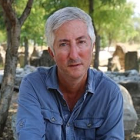
Автор
Лучшие книги Эрика Х. Клайна
- 4 произведения
- 5 изданий на 2 языках
По популярности
-
1177 год до н.э. Эрик Х. Клайн
ISBN: 978-5-17-099337-6 Год издания: 2018 Издательство: АСТ Язык: Русский РазвернутьПосле столетий процветания цивилизованный мир бронзового века пришел к резкому и катастрофическому концу. Царства рухнули подобно домино всего за несколько десятилетий. Не стало более минойцев и микенцев, хеттов и вавилонян. Развитые цивилизации конца II тысячелетия до н. э., которые простирались от Греции до Египта и Месопотамии, внезапно прекратили свое существование. Наступили первые "темные века". Как это произошло? И кто был виновником этого масштабного всеохватывающего коллапса? В своей книге Эрик Клайн, отвечая на эти вопросы, рассказывает нам захватывающую историю о том, как коллапс цивилизаций был вызван многочисленными…
-
Biblical Archaeology: A Very Short Introduction Эрик Х. Клайн
ISBN: B00C1PXKVI Год издания: 2013 Издательство: Audible Studios Язык: Английский Public interest in biblical archaeology is at an all-time high, as television documentaries pull in millions of viewers to watch shows on the Exodus, the Ark of the Covenant, and the so-called Lost Tomb of Jesus. Important discoveries with relevance to the Bible are made virtually every year - during 2007 and 2008 alone researchers announced at least seven major discoveries in Israel, five of them in or near Jerusalem. Biblical Archaeology offers a passport into this fascinating realm, where ancient religion and modern science meet, and where tomorrow's discovery may answer a riddle that has lasted a thousand years. Archaeologist Eric H. Cline here offers a complete overview of this exciting field. He discusses the early pioneers, such as Sir William Matthew Flinders Petrie and William Foxwell Albright, the origins of biblical archaeology as a discipline, and the major controversies that first prompted explorers to go in search of objects and sites that would "prove" the Bible. He then surveys some of the most well-known biblical archaeologists, including Kathleen Kenyon and Yigael Yadin, the sites that are essential sources of knowledge for biblical archaeology, such as Hazor, Megiddo, Gezer, Lachish, Masada, and Jerusalem, and some of the most important discoveries that have been made, including the Dead Sea Scrolls, the Mesha Inscription, and the Tel Dan Stele. Subsequent chapters examine additional archaeological finds that shed further light on the Hebrew Bible and New Testament, the issue of potential frauds and forgeries, including the James Ossuary and the Jehoash Tablet, and future prospects of the field.
Biblical Archaeology: A Very Short Introduction captures the sense of excitement and importance that surrounds not only the past history of the field but also the present and the future, with fascinating new discoveries made each and every season. -
After 1177 B.C.: The Survival of Civilizations Эрик Х. Клайн
ISBN: 0691192138, 9780691192130 Год издания: 2024 Издательство: Princeton University Press Язык: Английский In this gripping sequel to his bestselling 1177 B.C., Eric Cline tells the story of what happened after the Bronze Age collapsed—why some civilizations endured, why some gave way to new ones, and why some disappeared forever
At the end of the acclaimed history 1177 B.C., many of the Late Bronze Age civilizations of the Aegean and Eastern Mediterranean lay in ruins, undone by invasion, revolt, natural disasters, famine, and the demise of international trade. An interconnected world that had boasted major empires and societies, relative peace, robust commerce, and monumental architecture was lost and the so-called First Dark Age had begun. Now, in After 1177 B.C., Eric Cline tells the compelling story of what happened next, over four centuries, across the Aegean and Eastern Mediterranean world. It is a story of resilience, transformation, and success, as well as failures, in an age of chaos and reconfiguration.
After 1177 B.C. tells how the collapse of powerful Late Bronze Age civilizations created new circumstances to which people and societies had to adapt. Those that failed to adjust disappeared from the world stage, while others transformed themselves, resulting in a new world order that included Phoenicians, Philistines, Israelites, Neo-Hittites, Neo-Assyrians, and Neo-Babylonians. Taking the story up to the resurgence of Greece marked by the first Olympic Games in 776 B.C., the book also describes how world-changing innovations such as the use of iron and the alphabet emerged amid the chaos.
Filled with lessons for today's world about why some societies survive massive shocks while others do not, After 1177 B.C. reveals why this period, far from being the First Dark Age, was a new age with new inventions and new opportunities. -
The History of Ancient Israel: From the Patriarchs Through the Romans Эрик Х. Клайн
Год издания: 2008 Издательство: Recorded Books Язык: Английский Israel conjures up myriad associations for peoples of all cultures and religious backgrounds. Inextricably associated with the world's three most prominent religions (Judaism, Christianity, and Islam), Israel is steeped in history and conflict, much of which is known through the tales of biblical figures such as Moses, David, Solomon, and, of course, Jesus Christ.But how much of the Bible can be relied upon as accurate history? And how much of the biblical record can be verified through archaeology? Esteemed professor, researcher, and author Eric H. Cline of The George Washington University addresses these and other questions in this fascinating series of lectures.



